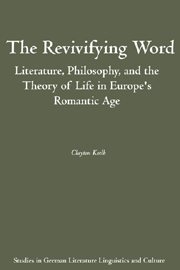Preface
Published online by Cambridge University Press: 05 February 2013
Summary
THIS BOOK EXAMINES A FRUITFUL POINT of intersection between the rhetoric of philosophy and the rhetoric of fiction during the Romantic century: the apostle Paul's well-known proposition that the dead letter can be revivified by the living spirit. This proposition provided the philosophical foundation for an aesthetic theory, and that theory in turn implied a remarkably productive narrative idea. The aesthetic theory focused attention on the mysterious process by which lifeless material objects mediate an interaction between the living minds of artists and their audiences. The narrative application was a set of literary texts in which characters cross the boundary between death and life with the help of some form of reading. Romantic aesthetics thus provided not only the theory but also the principal theme for a persistent genre of Romantic fiction. In both theory and practice, then, Romanticism was frequently a matter of life and death.
The period-concept “Romanticism,” though still much contested, is useful for a study like this one, which traces a concept (and a practice derived from that concept) that traveled widely geographically — from Europe to the United States and beyond — and extended in time from the middle of the eighteenth century to the middle of the nineteenth. In this book, therefore, I follow the proposal of William Galperin and Susan Wolfson, who have suggested redefining Romanticism as
an intellectually and historically coherent century-long category, 1750–1850, which we unabashedly call “The Romantic Century.” Our totalizing nomenclature may appear a bit backward-looking, especially for an era of revolutions. But the words and events of romanticism at this category’s center are actually quite consistent with the essential monism that lurks (at least teleologically) in the dialectical constitution of romantic studies currently in vogue, where “and” is invariably the keyword: margin “and” center; past “and” present; self “and” society; along with the host of rubrics that begin with “romanticism and.[…]
- Type
- Chapter
- Information
- The Revivifying WordLiterature, Philosophy, and the Theory of Life in Europe's Romantic Age, pp. x - xiiiPublisher: Boydell & BrewerPrint publication year: 2008



